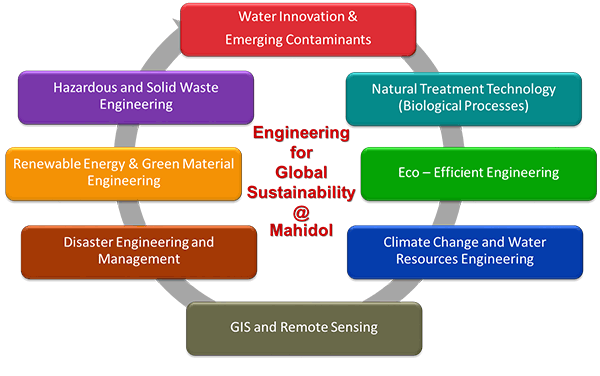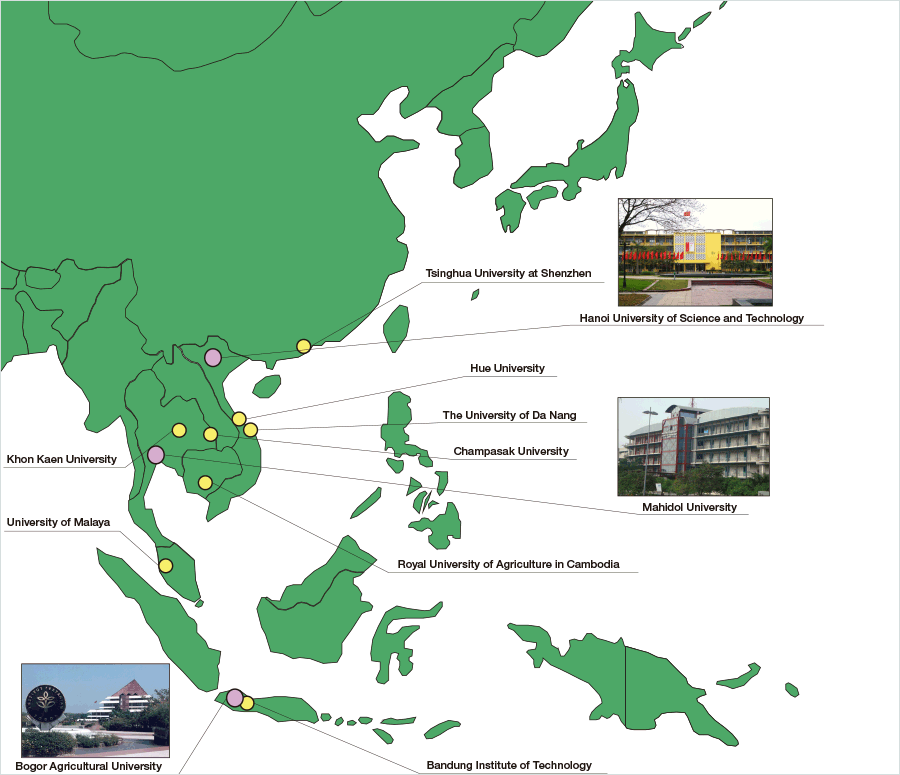Partner Universities
Mahidol University
Mahidol University is a multi-disciplinary and research-led institution with key competencies in the arts, medicine and science. Given this expertise, Mahidol University is a leading center of knowledge and understanding, and is determined to live up to its motto of being the “Wisdom of the Land”.
The Faculty of Engineering aims to meet the needs for real applications for real industries – based on the country’s policies and the readiness and diversity of faculty members, research and university resources. Therefore, interdisciplinary research is the key to our success in attaining world-class levels of engineering excellence.
The Department of Civil and Environmental Engineering’s mission is to produce graduates who not only possess technical knowledge and skills in both civil and environmental engineering fields, but also show initiative and have the ability to clearly communicate and transfer their knowledge and technology to other people and professionals.
Mahidol University faculty and students in the Graduate Program in Environmental and Water Resources Engineering conduct research on various topics- including Water Innovation and Emerging Contaminants; Eco-Efficient Engineering; Hazardous and Solid Waste Engineering; Natural Treatment Technology; Renewable Energy and Green Material Engineering; Disaster Engineering and Management; Climate change and Water Resources Engineering; GIS and Remote Sensing. We aim to create new knowledge, develop innovative solutions to global environmental problems, and work collaboratively to advance the current state of knowledge and make meaningful contributions to our environment.

The Hanoi University of Science and Technology
The Hanoi University of Science and Technology (HUST) was founded in 1956 as the first national technical college in Vietnam and is located in the southern part of Hanoi. It consists of 14 faculties, seven research institutes and 18 centers, and has a high reputation as one of the leading universities in Vietnam – offering courses in almost all fields of science and engineering. About 1,650 faculty members teach 40,000 undergraduate students and 2,000 graduate students. The university is particularly well known for its strength in the engineering fields, and actively conducts research activities in addition to providing advanced education. The Kyoto University – Hanoi University of Science and Technology Research and Education Program in Environment Studies was established in December 2008. This program is the foundation of the Environmental Innovator Program (EIP) in Hanoi.
Introduction to research activities at the Hanoi office
The Kyoto University – Hanoi University of Science and Technology Research and Education Program in Environment Studies has an office and a laboratory in the School of Environmental Science and Technology. The Hanoi University of Science and Technology allows EIP students and researchers to carry out environmental analyses and experiments. A cross-appointed faculty member of Kyoto University and Hanoi University of Science and Technology will soon be stationed at this office, working with a program-specific secretary. The program has already accommodated many students from Kyoto University by means of internship activities, conducting research on various topics such as the aquatic environment, urban sanitation, waste and the atmosphere – using Hanoi and its surroundings for fieldwork. The program has also conducted research in collaboration with other research institutions in Hanoi such as the Hanoi University of Civil Engineering, the Vietnamese Academy of Science and Technology, the Institute of Environmental Technology, and the Hanoi School of Public Health.
Bogor Agricultural University (IPB)
Bogor Agricultural University (IPB) was established on September 1, 1963, based on the visionary thinking of our nation’s leader who recognized the need for a world-class university with competencies in agriculture, bioscience, and various related fields This was intended to strengthen food security, bio-energy development and job creation, and to bring about poverty alleviation and environmental preservation.
Graduate Studies
In 1975, the first School of Post Graduate Studies was established in Indonesia and Bogor Agricultural University was the pioneer in establishing such schools. Then, in 1980, the School of Post Graduate Studies of Bogor Agricultural University became the Faculty of Post Graduate Studies of Bogor Agricultural University. Gradually, over the following years, various new departments were established – greatly helped by the return home of some faculty members who had pursued their postgraduate studies abroad. By 1983, the number of departments had reached 21 and they were reorganized into the Field of Studies until mid 2007. At the end of 2007, the program courses were changed to majors. Currently, the School of Graduate Studies of Bogor Agricultural University has 65 majors courses in the Master Degree Program and 43 majors courses in the Doctoral Degree Program.






